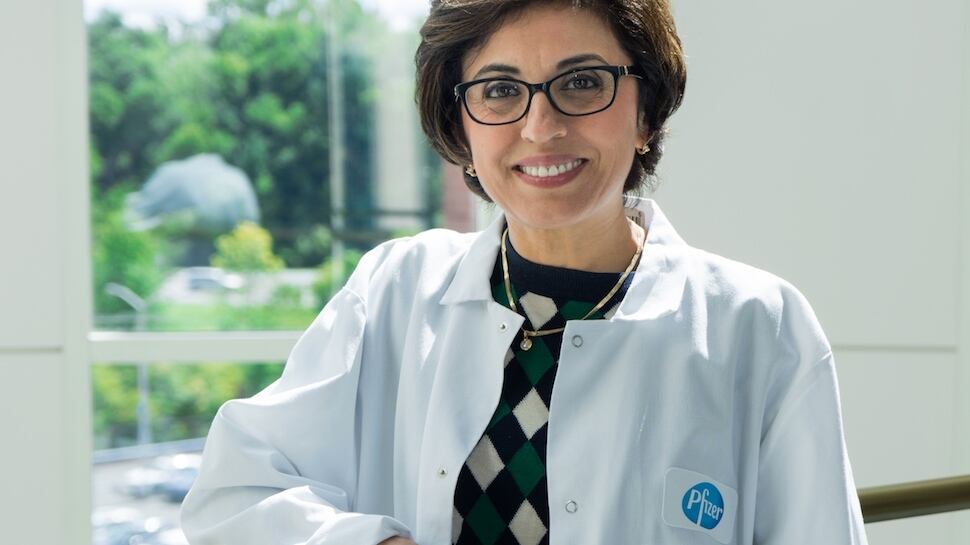As a Masters’ student in the UK, encounters with young cancer patients at a children’s hospital motivated Keziban Unsal-Kacmaz to dedicate her life to oncology research.
Today, as a researcher working on oncology drug discovery at Pfizer, Unsal-Kacmaz recalls the moment she first put a human face to cancer.
Unsal-Kacmaz was enamored with science from a young age. She recalls sitting in front of the television as a child, fascinated by Jacques Cousteau's aquatic adventures; this early curiosity about biology grew over time into a passion for a more specific field, genetics. “I was inspired by Alec Jeffreys’ work—because of his discovery of genetic fingerprinting, we had the ability to apply our knowledge of genetics to help people in anything from solving crimes to paternity to medical research. I was fascinated by genetics after learning about his work,” she says. By age 21, Unsal-Kacmaz was so motivated by her love of discovering the unknown to move 2,000 miles away from her homeland of Turkey to the United Kingdom. There, while she was learning to speak English, she interned in Jeffreys’ lab, researching the importance of short sequences of DNA to track genetic mutations. After that, she enrolled to study genetics at the University of Nottingham, and quickly confirmed that her interest in science was not a phase but rather fuel for a life’s work.
“The most exciting thing for me to do is science,” says Unsal-Kacmaz, reflecting on the deep joy her work brings to her life. “I’m inspired by solving problems, by immersing myself in science, by knowing the unknown. But what I realized early on was that I wanted to do something that would directly impact people.”
Unsal-Kacmaz’s research lab at the University of Nottingham was located adjacent to the Nottingham Children’s Hospital. This meant that, on the way to work every morning, the young geneticist passed through the Children’s Hospital’s cancer ward. Here, Unsal-Kacmaz had near-daily encounters with young cancer patients, an experience that would change the course of her professional life.
“I remember seeing pale children with no hair. I had never imagined the effects of chemotherapy on patients, and it was especially painful to witness it in innocent children. The images of those kids’ faces stayed with me for years.”
These daily encounters motivated Unsal-Kacmaz to change her academic focus from genetics to cancer research, a career path that eventually took her from England to Ankara and then on to Paris, and then to the United States. In America, she continued her research, working at UNC-Chapel Hill as a post-doc researcher alongside Nobel Prize-winning chemist Aziz Sancar and another early mentor, Bob Abraham—head of oncology research at Pfizer, where she was hired in 2008.

Today, at Pfizer, Unsal-Kacmaz works in an exciting area of research called immuno-oncology. This field involves helping the body’s immune system more efficiently battle and kill cancer cells. The particular area that Unsal-Kacmaz investigates is dedicated to making our immune cells more effective at identifying cancer.
One of the many factors that make cancer difficult to treat is its ability to hide from the immune system, wherein tumor cells “disguise” themselves so that the immune system cannot recognize them. A complex process, scientists are still working to fully understand it. What we do know: these mechanisms allow the tumor cells to continue to multiply so that tumors can grow and spread to other parts of the body.
Unsal-Kacmaz’s research in immuno-oncology seeks to better prepare the immune system to deal with cancerous cells. As she puts it: “Most tumor cells are defective in presenting antigens, and therefore they cannot be targeted by our immune cells. The goal of my laboratory’s research is to try to restore antigen presentation so that tumor cells can be recognized and killed by immune cells.”
Despite her many years in research, Unsal-Kacmaz still feels just as much investment in this critical work as she did when as a student in the lab. The work, for her, is its own reward. “I feel very fortunate to have the opportunity to make a difference for cancer patients through my work at Pfizer,” she says. “I do this research because it’s my passion.” And while she no longer passes through a children’s cancer ward on her way to her work, another child in her life helps to guide and motivate her research: her seven-year-old son.

“As a mom, I care about raising my son to also feel passionate about what he does,” says Unsal-Kacmaz, who adds, “I try to explain to my son why I do what I do. I think he understands and is proud of me, and that means a lot.”
Unsal-Kacmaz believes her research is only getting started, and she’s optimistic—not only for her team, but for cancer research throughout the world. For this reason, she begins each day with the same motivation she had many years ago as a young science student in the UK: to explore and to know the unknown.
Explore more stories like Keziban’s and other exciting scientific breakthroughs at Pfizer.com/discover.





